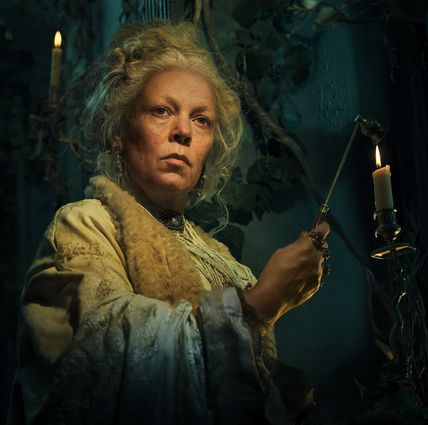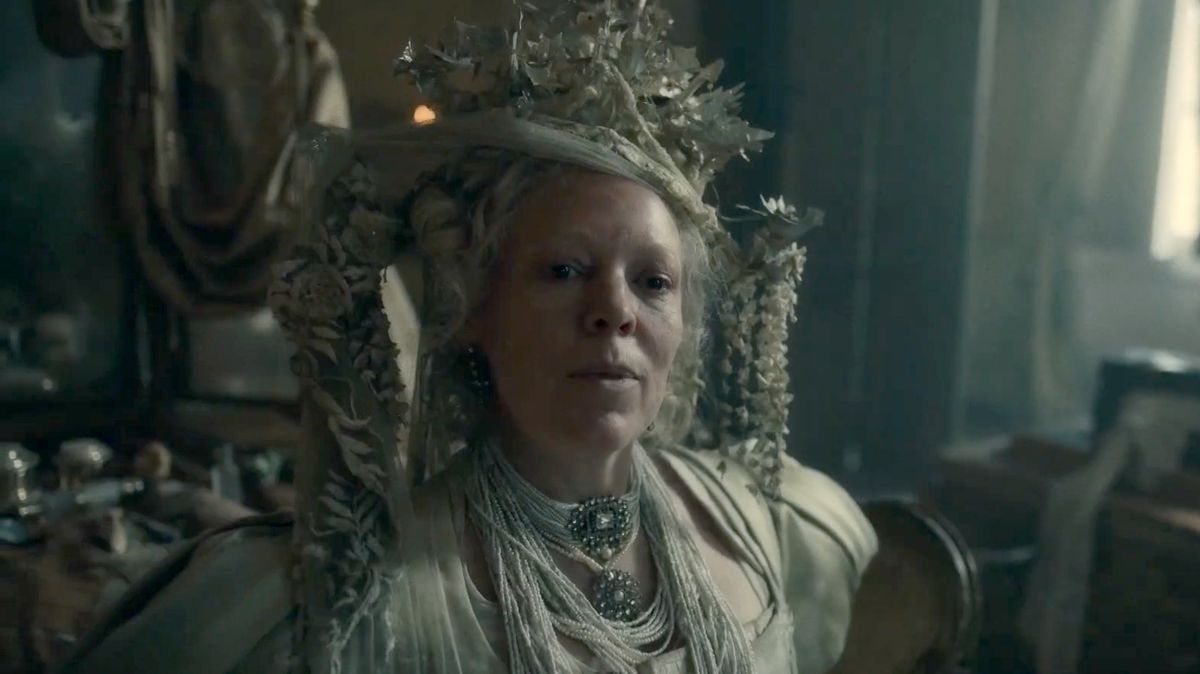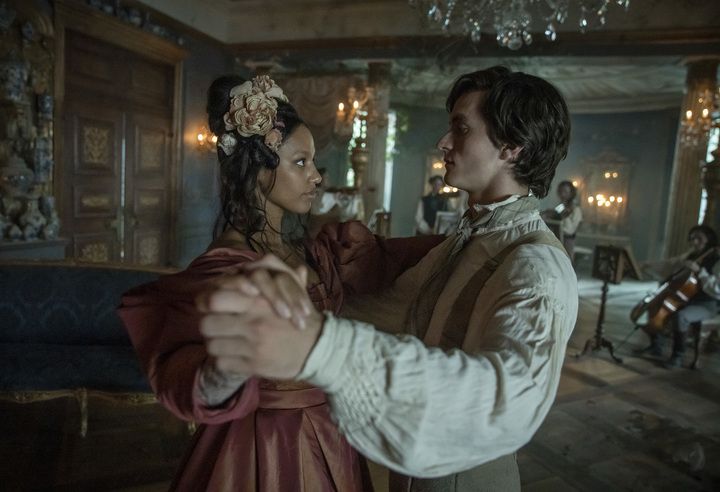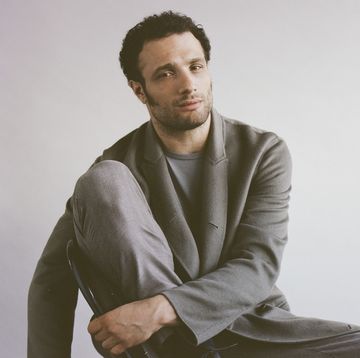There are lots of Charles Dickens adaptations. We’re up to seven movies and two high calibre TV series of Great Expectations alone. You know the deal: young Pip, the blacksmith who doesn’t want to be a blacksmith; Miss Havisham; Estella; convicts; mysterious benefactors. It’s the most Dickensian bit of Dickens going. But in the hands of Peaky Blinders, Locke and Spencer writer Steven Knight, the BBC's new six-parter is not your usual Dickens adaptation.
On Zoom from his home in Gloucester, Knight reaches for a metaphor. There’s a mountain, and there’s a painter who makes an image of the mountain. “Now, the painter is not saying this is the mountain," he says. "The painter is saying, this is my impression of the mountain.”
Knight’s impression of Dickens’ mountain adds a couple of outcrops. Olivia Colman’s Miss Havisham [pictured above] is waspish and cruel, as you’d expect; she also smokes opium and her mansion is built on slavery. Meanwhile, Matt Berry’s Mr Pumblechook pays Pip’s sister Sara Gargery to thrash him with a cane.
Despite some less than favourable early reviews, Knight, is ebullient about the series. The response overall, Knight says, has been “fantastic”. “We did a screening last week to a live audience and it was brilliant. You get a feeling if it's going [in the room] or it's not.”
Knight's own plans are looking equally robust. A good year after Peaky Blinders came to an end, the Shelby saga continues in ballet and immersive experience form. An announcement about the film (despite uncertainty from some key quarters) is “very imminent” too, he says. “It will never stop as long as people want it, you know? It's like a chip shop. If people stop coming then it'll close down.”
When we speak, Knight had just been unofficially tagged as the writer of the next Star Wars movie too – not that he’s at liberty to say anything. “It’s been leaked,” he explains, “so I can’t go around saying ‘Yay!’” (But, implicitly: yay.)
For now though, he has a glossy and gritty drama series in the can, and his own great expectations can wait. And anyway, like Dickens, he says, there's something appealing about uncertainty.
“When I'm writing stuff, I don't know what's gonna happen, really, at the end. So maybe he was the same,” he says. “It’s like, how am I going to pull the rug now?”
What was your first encounter with Dickens?
I suppose it was when I was a kid. The BBC used to do these Sunday afternoon adaptations. The scenery used to move around and it was very, very low budget, but they used to get the best actors so the performances were always good. And I was always taken by the fact that working class characters in these adaptations weren't idiots or clowns or always dangerous, you know?
Is there anything you saw in Dickens’ work which you added to your writing toolkit?
For me it doesn't work quite like that, but you do recognise certain things. His use of dialogue is so brilliant, his phonetic dialogue is fantastic. He does forgive the characters for what they do, and there's always a kind of melancholy humour about how awful they are. He’s living in mid-19th century England and everybody's wagging fingers and throwing people into workhouses for being immoral, and he's not like that.
Great Expectations is remade a lot – what’s essential about yours, and why make it now?
I think as well as being a love story it’s about class, and it's such an unfashionable topic at the moment. When I was growing up, politics was about class. Now it's not, it's about race and gender much more. But this is about someone who is from a particular class and believes that he can get out, and tries to get out, and – it's not exactly a spoiler – fails to get out. The question I ask with Dickens is, is he saying when he [Pip] goes back to his roots, that it's wonderful, it's great, this is what he should have done all along – in which case is he implying that's what everybody should do – or is he saying, look how terrible this is. Here is someone this bright who isn't able to get out. I dunno which one it is, but you have to put it against the backdrop of what was happening politically at the time, when people were not talking about the individual getting out. They were talking about the collective changing circumstance by getting together – you're into Marx and Engels. But Dickens is way too beautiful a soul for that, I think.
Both you and Pip were raised by blacksmiths.
I spent a lot of time when I was a kid, not going to school, but going out shoeing horses in scrap metal yards and riding stables meeting lots of interesting people who eventually helped with Peaky. I felt that expectation for Pip, which is not even like a conscious thing. It's not like someone says, I'm gonna stop you doing anything other than this. It's like, that's what you are. That's how you are born. So any other ambition is, like, weird. The leap that is required in order to go from that to believing it when he [Pip] says, I want to be a gentleman – to a contemporary audience of people maybe who’ve had a different upbringing, it doesn't seem that big. But in fact, it’s like [saying you’re] reinventing yourself as a horse. It’s mad.
There are a few tweaks – your Miss Havisham smokes opium.
The thing is that now the ingestion of opium is a big deal. And so it should be. At that point, children were given opioids in liquid form. There used to be a cough medicine that had opium in, that I remember. Someone in her position with probably frightful memories and probably some physical pain, the idea that she wouldn't be taking a painkiller – both emotional and physical – is a bit of a stretch. Now, I accept that someone taking a spoonful of laudanum is less photogenic than smoking. But the fact is that it was not illegal and it was a very straightforward way of easing the pain of life.
I wasn’t expecting to see Matt Berry having his bare arse caned either.
Again it's like, did that – ah – avenue of pleasure begin in 1968 as most people seem to believe it did, or has it always been there since the ancient Greeks? And I think it's the latter.
Having finished Peaky Blinders last year, most people would have taken a holiday or slowed down for a bit. But you seem to always have a new thing on the go.
I love it. I love to do it. I mean, there is also the element of the pandemic – I was writing and not a lot was getting made, so there was like two and a half years of stuff that built up, [and] a lot of that is now coming through the pipeline. But I love doing it. I sort of can't stop.
'Great Expectations' starts at 9pm on Sunday on BBC One and BBC iPlayer














